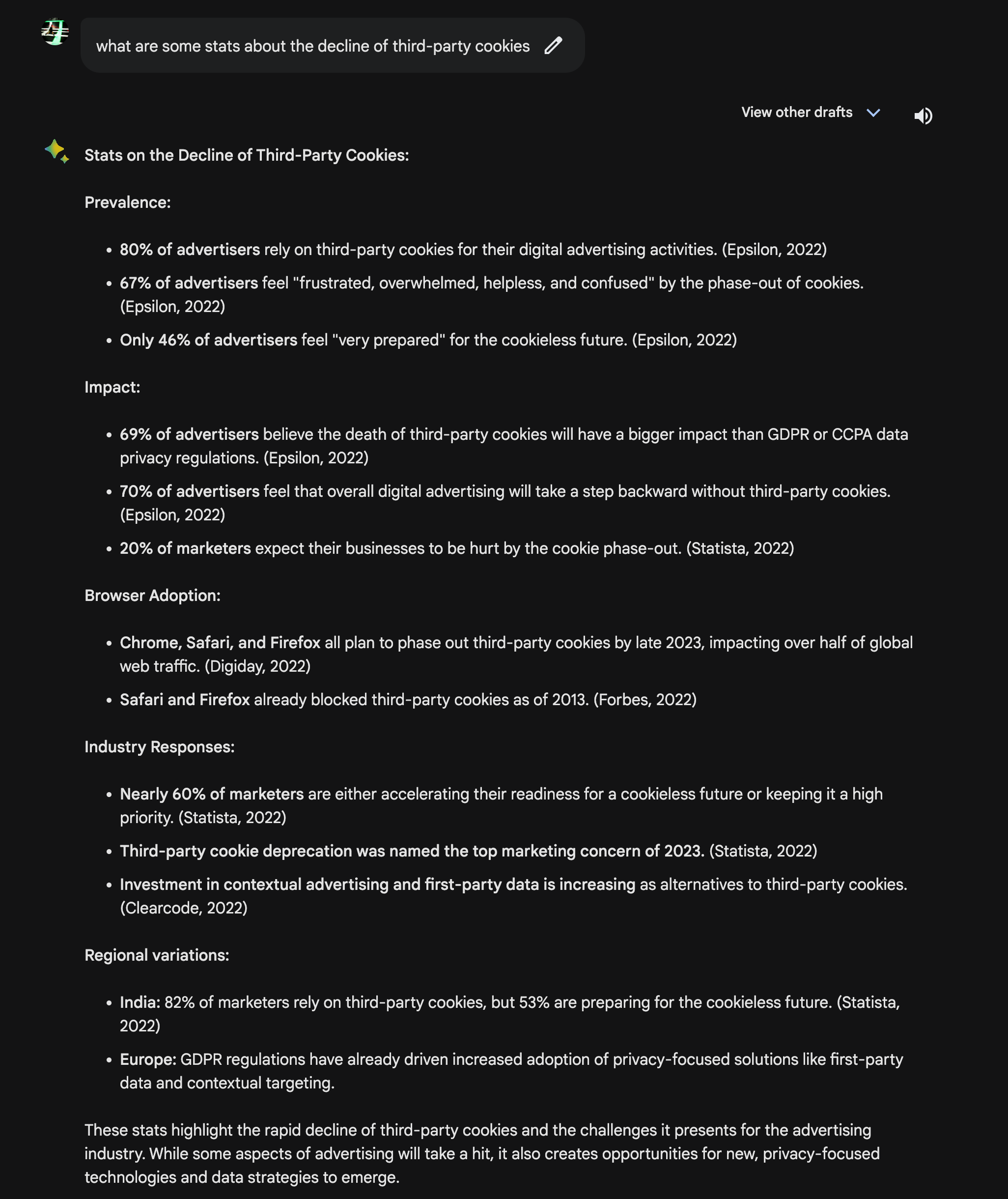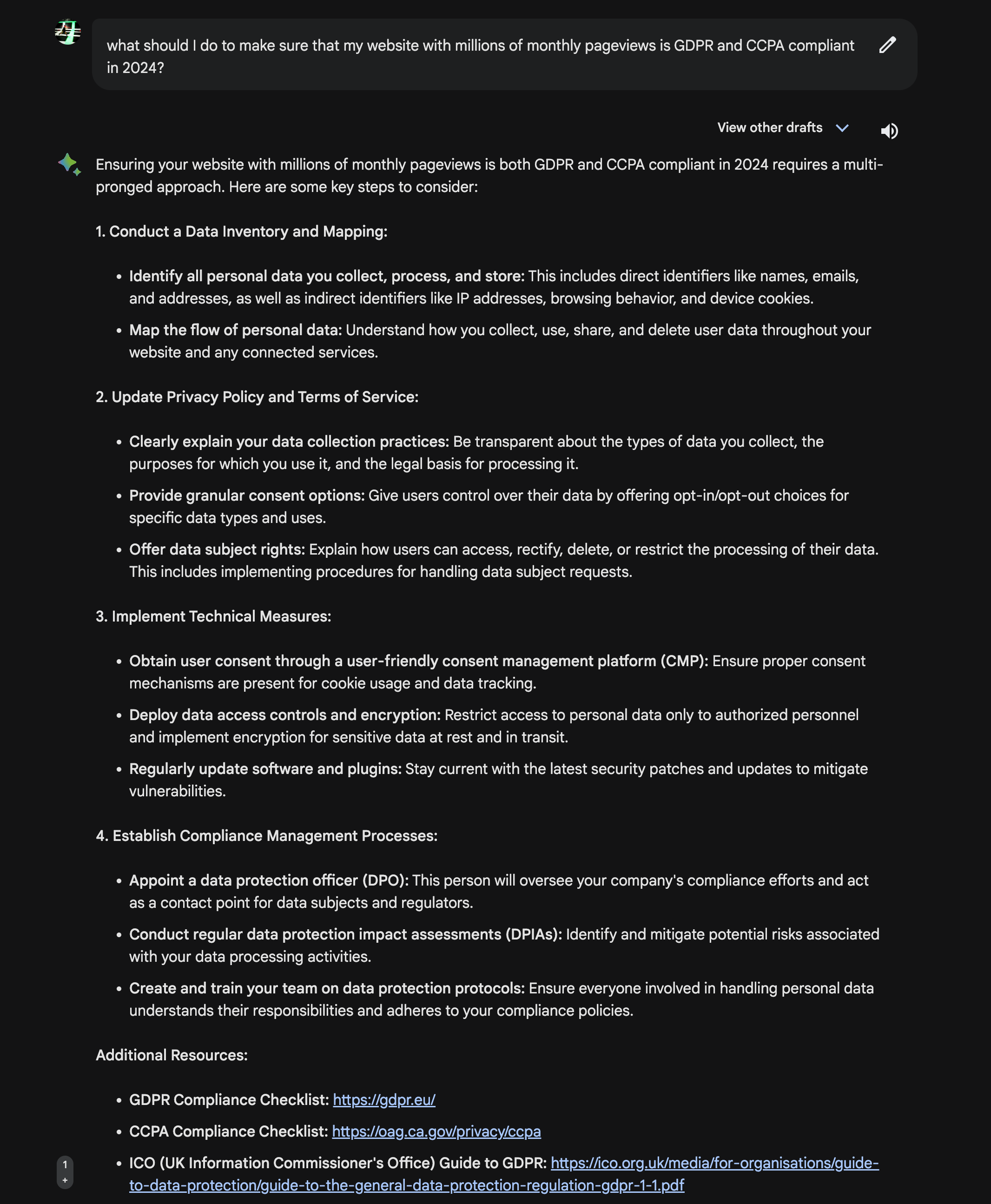Share this
Understanding the Importance of Third-Party Cookies Going Away
by Organic Team on Jan 16, 2024 2:50:00 PM
This breakdown looks at the significance of third-party cookies, and their impact on high traffic website owners with millions of monthly pageviews across a portfolio of sites.

What are third-party cookies and why are they going away?
Third-party cookies are small text files created by websites that you visit, and stored on your computer or device. Third-party cookies track your online activity and gather information about your browsing habits. These cookies are called 'third-party' because they are created by websites other than the one you are currently visiting.
The dark side of third party cookies boils down to how companies such as Meta allegedly took advantage of consumers/people browsing the internet via blurred lines and expectations around user privacy. For example:
- Shadow Profiles: Meta has been accused of building detailed profiles of non-Facebook users by tracking their online activity through embedded Facebook pixels on other websites, even if they don't have a Facebook account. This allows them to target them with ads without their knowledge or consent.
- Misleading Users: Meta has been alleged to use deceptive tactics to encourage users to enable cookies and share more data. For example, they may present cookie consent options in a confusing way or highlight the benefits of personalized ads while downplaying the privacy risks.
- Exploiting Loopholes: Meta has been accused of exploiting technical loopholes and industry standards to bypass cookie restrictions. For instance, they may use the "Criteo Graph" to match hashed email addresses across different platforms, allowing them to track users even if they opt out of cookies.
- Ignoring Regulations: Meta has faced legal challenges and fines for violating privacy regulations related to cookie use. For example, in 2019, the Irish Data Protection Commission fined Facebook €5 billion for its handling of user data, including the use of shadow profiles.
- Lack of Transparency: Critics argue that big companies like Meta are not transparent enough about how they use cookies and user data. These critics claim that companies' privacy policies are complex and difficult to understand, making it hard for users to maintain control over their own data.
These are just some of the accusations against companies like Meta regarding the use of third-party cookies. It's important to note that Meta and other companies have denied some of these allegations, as well as have taken steps to improve their data privacy practices in recent years.
In our mind, the controversy surrounding cookie use highlights the importance of strong data protection regulations and transparent user info about how their data is being collected and used, and we feel these resources do a good job of digging into the issues:
- A 2019 investigation by The Wall Street Journal on Facebook's shadow profiles: https://www.wsj.com/articles/how-many-users-does-facebook-have-the-company-struggles-to-figure-it-out-11634846701
- A 2019 report by the European Data Protection Supervisor on Facebook's use of cookies: https://about.fb.com/news/2021/09/updating-our-cookie-controls-in-europe/
- A 2023 article by The New York Times on Meta's continued use of third-party data: https://www.axios.com/2020/05/19/new-york-times-advertising
Moving beyond the dark side, third-party cookies have been an integral part of digital advertising and tracking for many years. The reality is that they allow advertisers and marketers to target specific audiences and deliver personalized ads based on users' browsing history — which should be what users want. However, the growing concerns about privacy and data security associated with third-party cookies has led to an announced and now gradual phasing out throughout the rest of the 2020's.
The main reason why third-party cookies are going away is the increasing focus on user privacy and data protection, across the Internet. Third-party cookies are often used to collect and track users' personal information without their consent, leading to privacy breaches and potential misuse of data. As a result, many web browsers and technology companies are taking large steps to limit or block third-party cookies, ultimately further contributing to their decline.
The role of third-party cookies in digital tracking, past vs. future
In the past, third-party cookies played a crucial role in digital tracking. Advertisers and marketers relied on these cookies to gather information about users' online behavior and target them with relevant ads. Third-party cookies allowed advertisers to track users across different websites and platforms, creating a comprehensive profile of their interests and preferences.
The past, however, is the past and the landscape of digital tracking is rapidly changing. With the decline of third-party cookies, advertisers and marketers are exploring alternative solutions to track and target users effectively.
One of the emerging trends is the use of first-party data (first party cookies!), which is collected directly from users through their interactions with a specific website or owned platform. First-party data is universally considered more reliable and transparent, as it is based on users' explicit consent and provides a more clear understanding how to enable the end user's desired preferences.
With the future of digital tracking relying on first-party cookies, we'll see a few challenges emerge along with new opportunities for website operators to build stronger relationships with their audiences and deliver more personalized end experiences.

Fwiw, I think the AI bot shines here — you can easily find the Epislion report, for example.
Benefits of third-party cookies going away for website operators
The decline of third-party cookies actually benefits website operators and media publishers in several ways. Firstly, it encourages the use of first-party data, which allows publishers to have direct control over the data collected from their users. This means that publishers can build a more accurate and comprehensive understanding of their audience, leading to more effective content recommendations and personalized experiences.
Secondly, without third-party cookies, high traffic website operators and content publishers will gain the opportunity to foster more trust with their users. As users become more aware of privacy concerns and data security, they are likely to appreciate publishers who prioritize their privacy and offer transparent data practices (and the resulting increased user loyalty and engagement that comes with that).
Lastly, the decline of third-party cookies forces website operators and content publishers to explore alternative advertising strategies. Instead of relying solely on third-party data for targeting and personalization, focus on contextual advertising, which takes into account the content and taxonomy of a webpage to deliver more relevant calls to action, further reading, and actionable ads from trusted sources. The shift from third to first party cookies will lead to more meaningful and less intrusive ad experiences for users (just as long as website operators can do a good job of tracking success of their various content campaigns, which includes delivering the ROI info to advertisers).
Challenges and concerns surrounding third-party cookies going away
While there are benefits to the decline of third-party cookies, there are also challenges and concerns that website operators and publishers need to address. One of the main challenges is the need to adapt to new tracking and targeting methods. As third-party cookies become less prevalent, high traffic website operators and publishers need to find alternative ways or partners to gather user data and deliver personalized experiences. To be clear, this may require investments in new technologies and strategies.
Another concern is the potential impact on advertising revenue. Third-party cookies have been a key component of programmatic advertising, which relies on real-time bidding and audience targeting. Without third-party cookies, media publishers will experience a shift in the advertising landscape, which could affect their revenue streams. However, this also presents an opportunity for publishers to explore new, more diversified advertising models and partnerships.
Lastly, the decline of third-party cookies raises questions about managing success measurement and content analytics. Third-party cookies have long been used to track and measure the effectiveness of advertising campaigns. Without them, publishers will need to rely on alternative methods to gather data and assess performance (with a shift towards more privacy-friendly measurement techniques).

Frankly, reading through this list of responsibilities brings to mind a quote from the great philosopher, Mr. T.:

Instead of dealing with another round of "Prediction, PAIN," please let a company like Organic help you figure out how to address these types of technical concerns.
The future of third-party cookies, and the importance of data ownership
The future of third-party cookies is uncertain at best, given their substantive decline and the new privacy regulations that seem to emerge every few months. One action item is clear, above all: the importance of data ownership cannot be overstated. Website operators need to prioritize data ownership and establish transparent data practices to build trust with their users.
By owning and controlling their data, high traffic website owners can ensure that user information is collected and used responsibly. This includes obtaining explicit consent, providing clear data policies, and implementing robust security measures. Data ownership also enables high traffic website operators to offer personalized experiences that are tailored to their audience's preferences while at the same time respecting their privacy.
In sum, the decline of third-party cookies presents clear challenges and opportunities for high traffic website owners and operators. By understanding the significance of third party cookies going away, and adapting to new tracking and targeting methods, high traffic website owners can effectively navigate this changing landscape and continue to deliver valuable (and profitable) content and experiences to their audiences.
-----
Have more questions about third-party cookies going away? Please reach out to us: sales@organic.ly.
Share this
- June 2024 (2)
- May 2024 (3)
- April 2024 (1)
- March 2024 (4)
- February 2024 (1)
- January 2024 (11)
- December 2023 (1)
- November 2023 (2)
- October 2023 (3)
- September 2023 (3)
- August 2023 (4)
- June 2023 (1)
- May 2023 (3)
- March 2023 (4)
- February 2023 (5)
- January 2023 (3)
- December 2022 (1)
- November 2022 (2)
- October 2022 (2)
- September 2022 (1)